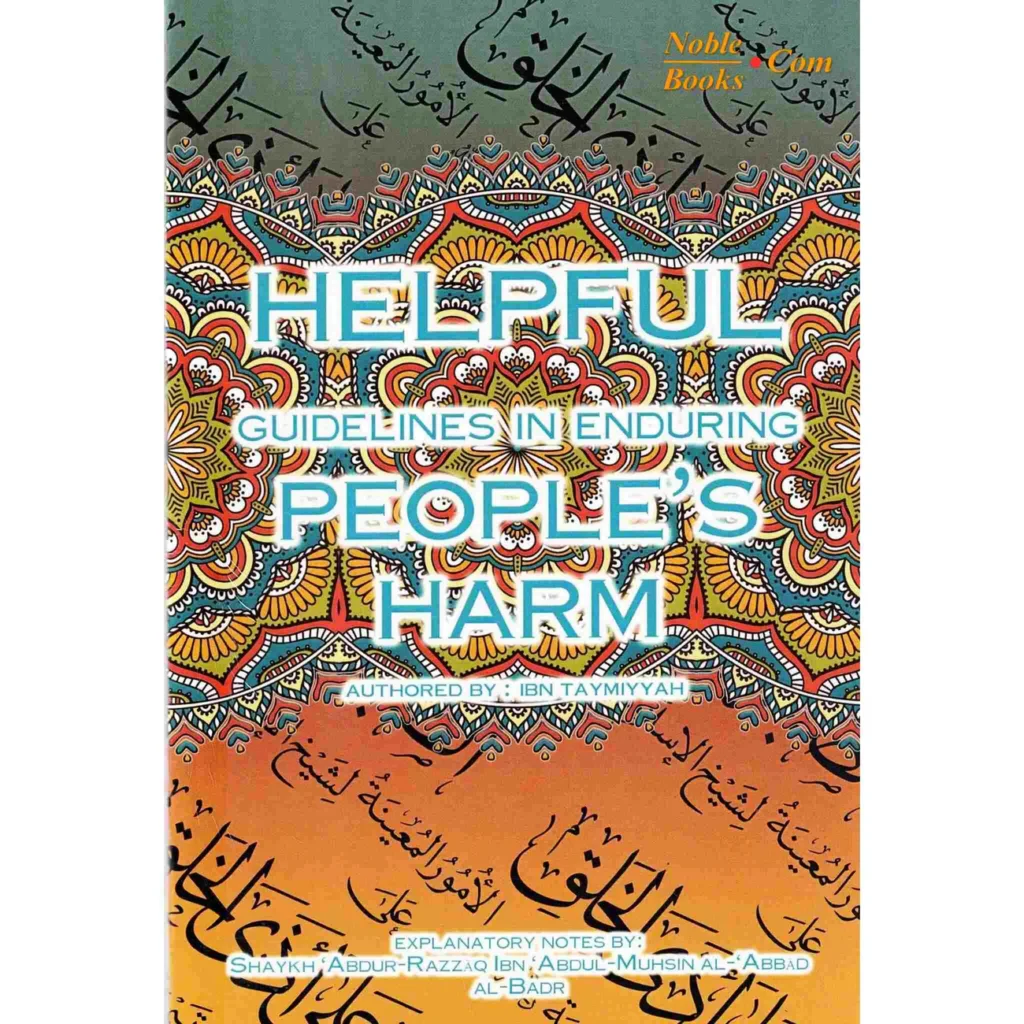
In Helpful Guidelines in Enduring People’s Harm, Shaykh al-Islām Ibn Taymiyyah deals with one of the greatest emotional tests Muslims may experience suffering hurt, criticism, and injustice from people. This short but potent book offers a direct view based on the Qur’an and Sunnah of how a believer ought to conduct himself in such adversity while maintaining their Iman and Akhlaq. Ibn Taymiyyah does not give only theoretical guidance; his statements are spiritual strength born of profound Islamic learning and individual perseverance against adversity.
The writer reminds us that this world’s life is full of difficulties, and one of the greatest among them is the harm that results from people. No matter if it’s verbal abuse, betrayal, or unfair treatment, a believer is commanded to react with patience, humility, and a heart that turns ever to Allah. The book illuminates how Prophet Muhammad ﷺ dealt with such injury with grace and forgiveness, setting the ultimate example for us all to emulate.
Islamic Guidelines for Forgiveness
One of the central themes of this book is the urging to forgive harm that comes to us. Ibn Taymiyyah masterfully relates this act of forgiveness to the larger Qur’anic teachings that repeatedly challenge believers to overcome their egos and seek reward from Allah. With strong Qur’anic quotes and Hadiths, the book establishes the fact that forgiving others is not indicative of weakness but of inner strength and true faith.
The author highlights that Allah knows all injustice and wrong done to His servants. Allah is the Best Judge, and nothing is hidden from Him. Hence, the Muslim must not take revenge for personal gratification but should leave everything to Allah. Ibn Taymiyyah’s statement makes us mindful that taking revenge taints the heart but forgiveness cleanses and uplifts it.
Adopting the Prophetic Pattern
The writer quotes several instances from the Seerah of the Prophet ﷺ to demonstrate how he handled harm and hostility. From the atrocities committed against him in Makkah to the physical torture and mental anguish inflicted upon him by his enemies, the Prophet ﷺ never let bitterness be a part of his heart. Ibn Taymiyyah inspires readers to embrace this prophetic mindset retaliating for hostility with generosity, for cruelty with kindness, and for ignorance with wisdom.
He illustrates how the Prophet’s ﷺ mercy was not confined to his followers or allies but even to those who were planning to hurt him. Such a high level of character involves spiritual maturity and honesty with Allah. The book encourages us to develop this high level of behavior and work for inner cleansing by means of perseverance and self-restraint.
Guarding the Heart against Hatred
Ibn Taymiyyah points out the risk of letting hatred and revenge into the heart. He delineates that a resentful heart cannot enjoy true tranquility. The believer is obligated to train their heart to release such emotions. Not because humans are worthy of forgiveness, but because we desire Allah’s pleasure. Through this, we safeguard our Iman and don’t let the fire of hatred engulf our spiritual development.
He also elaborates on how harboring the feeling of anger influences a person’s worship, relationships, and perspective on life. Increasing endurance for harm in the name of Allah will bring more understanding, peace, and depth in spirituality. It changes people’s understanding of others’ actions, seeing them as tests from Allah rather than personal attacks.
Practical Life Advice
What makes the book so effective is how Ibn Taymiyyah gives straightforward, tangible advice. He instructs that if we are done a wrong, we must first turn to Allah in du’a. Ask for His assistance and reward. We must not rush into retaliation, but rather take the way of sabr (patience) and isti’anah (seeking assistance from Allah).
He also emphasizes good manners and maintaining relationships even with the people who do us wrong. The believer should be a voice of peace and stability in the midst of their environment. Showing the light of Islam with their actions. The book brings comfort and assurance to anyone who feels burdened by the tribulations brought about by others.
A Timeless Work of Wisdom
Although concise, the book is full of ageless wisdom that holds good for all walks of life. Whether the harm is inflicted by family, colleagues, friends, or strangers. Ibn Taymiyyah’s advice still holds good and can change things for the better. It brings to mind that strength does not reside in revenge. But in rising above and leaving things to Him who knows everything.
This book is a must-read for anyone wishing to develop spiritually as they experience the pitfalls of human relationships. It is a guide to realizing inner peace in spite of keeping our dignity and faith intact. In the midst of a world plagued by conflict and misconceptions. Helpful Guidelines in Enduring People’s Harm is a source of hope and light.
Read more: Restoring One’s Iman By ‘Abdur-Razzāq Ibn ‘Abdul-Muhsin al-‘Abbād al-Badr